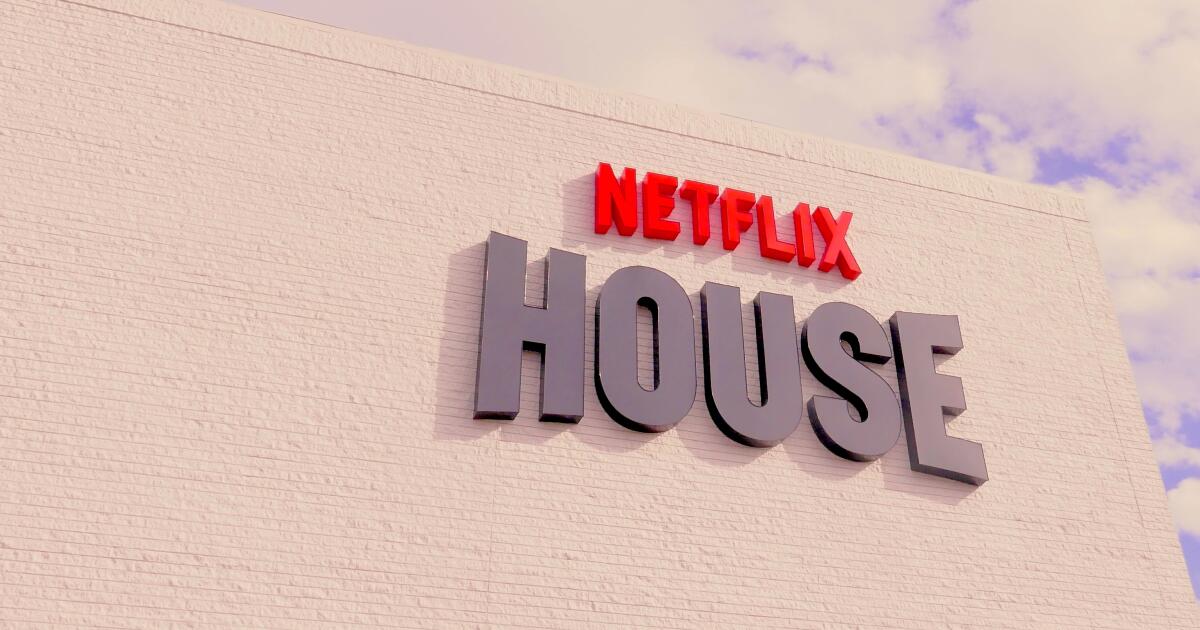Copyright Los Angeles Times

After years of telling consumers to Netflix and chill, the streaming giant now wants you get out of the living room and visit them at the local shopping mall. The company that upended the television landscape unveils its first entry into the “experiential” business this week, where consumers can wander through interactive game rooms and load up on food and drink inspired by their favorite Netflix hits. The first Netflix House, a 100,000-square-foot space in the King of Prussia Mall, 20 miles outside Philadelphia, opens Wednesday. The bright red entrance, a short walk from anchor department stores Macy’s and Neiman Marcus, is meant to be an homage to the envelopes used to mail Netflix DVDs back in the day. Murals featuring Netflix characters were painted on the outside walls by local artists. A second location is scheduled to open at the Galleria Mall in Dallas on Dec. 11 and another set for Las Vegas in 2027. Netflix co-Chief Executive Ted Sarandos has said he envisions the company opening as many as 60 Netflix House locations globally. The expansion will be new ground for the company, which will eventually reach a saturation point in U.S. subscribers. Revenue growth may have to come through new ventures so that the company can rely less on raising subscription prices and advertising rates. At this point, Netflix House is a marketing tool to create a deeper connection with consumers, Chief Marketing Office Marian Lee told The Times in an interview at the King of Prussia site. “We’re not doing this for the revenue piece,” Lee said. “It’s a way to give fans more things they can talk about. I want them to feel something and make plans to come back.” Netflix has done several hundred pop-up events such as a restaurant in Los Angeles where fans were able to connect with its signature shows such as “Stranger Things” and “Squid Games.” The consumer research gleaned from those who attended told Netflix there is a market for permanent venues that promote the brand, Lee said. Although Netflix and streaming have played a role in the diminished cultural status of the American shopping mall, Lee said the company’s move into a brick-and-mortar location will tap into consumers who long for in-person gatherings. “There is a little bit of resurgence to physical locations like malls,” Lee said. “There is nostalgia from generations coming up that want to go to the mall and have real-life experiences. It’s sort of capitalizing on people coming back to that.” Netflix House includes immersive rooms and interactive games based on its original series. Journalists were taken on a tour Monday, which included a visit through the murky hallways of Evermore Academy, including Wednesday Adams’ dorm room. Fans of “One Piece” can see whether they have what it takes to be a pirate in a 60-minute experiential game based on the series. There is also a 200-plus seat screening room — called the Tadum Theater — where Netflix will offer special public and private screenings of films, shows and live events, including its NFL games and WWE wrestling shows. A gift shop is packed with Netflix-show-themed merchandise and items created specifically for the market location. Philadelphia fans can acquire shirts emblazoned with “Are You Still Watching?” and “Netphlix” in Eagles green. Netflix House also offers a Netflix Bites restaurant with food, a full bar and decor inspired by the platform’s programs. Neon signs hanging above diners reference the streamers shows, past and present, such as “Orange Is the New Snack.” Admission to Netflix House is free, but ticket prices for the games and experiences start at $39. Virtual experiences cost $25 and a mini-golf course game will start at $15. Analysts who follow Netflix are taking a wait-and-see attitude about the Netflix’s move into out-of-home experiences. Brandon Katz, director of insights and content strategy at Greenlight Analytics, says there is value in Netflix strengthening its relationship with fans who pay for the service each month, comparing it to the theme parks that have helped sustain movie studios such as Disney and Universal. “They develop emotional attachments with consumers, particularly younger consumers, that ultimately results in a deeper level of fandom that stays with fans and audiences through generations,” Katz said. Michael Pachter, a managing director of strategic planning at Wedbush Securities, was skeptical, because brand awareness is not an issue for a company as well known as Netflix. “This is a solution in search of a problem,” he said.



